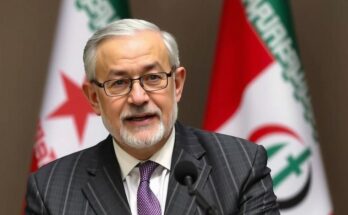Qatar has declared that it will not allow any military operations to be launched from Al-Udeid Air Base against other nations. Prime Minister Mohammed Bin Abdulrahman highlighted the importance of sovereignty in U.S.-Qatari relations. Amid ongoing regional conflicts, Qatar continues its mediation efforts in Gaza and Lebanon, stressing humanitarian concerns while addressing escalating violence attributed to Israel’s military actions against Hezbollah.
On Wednesday, Qatar firmly stated that it would not permit any military operations or attacks against other nations to be launched from the Al-Udeid Air Base, which is the largest U.S. military installation in the Middle East. Prime Minister and Foreign Minister Mohammed Bin Abdulrahman conveyed this position during an interview with Qatar TV, emphasizing, “The State of Qatar does not accept that attacks or wars be launched from Al-Udeid Base against countries in the region or beyond.” Al-Udeid Air Base currently hosts approximately 13,000 U.S. troops, according to reports from Al Jazeera. In discussing the strategic partnership between Qatar and the United States, Bin Abdulrahman reinforced that each nation maintains its sovereignty and refrains from interfering in the affairs of the other. Amid ongoing tensions in the region, particularly regarding Iran’s heightened state of alert due to the Israeli military response to a recent missile attack, Qatar has been actively mediating in the conflict within the Gaza Strip. Bin Abdulrahman acknowledged the challenges, remarking, “For more than a year, we have been mediating in the Gaza file but, unfortunately, the agreement requires two parties.” Additionally, he has been in contact with Lebanese officials to address the severe humanitarian crisis caused by ongoing warfare, which has resulted in the displacement of 1.2 million Lebanese citizens. The backdrop involves significant violence in Lebanon since September 23, with Israel conducting a substantial air campaign purportedly targeting Hezbollah, leading to over 1,500 casualties and displacing more than 1.34 million individuals. This military escalation is a continuation of the conflict that began a year ago when Israel’s offensive in Gaza resulted in the deaths of upwards of 42,400 people, predominantly women and children. Moreover, the escalation continued with Israel’s entry into southern Lebanon on October 1, indicating a widening scope of military engagement in the region.
The article addresses Qatar’s position regarding the use of the Al-Udeid Air Base, a critical U.S. military installation. It highlights Qatar’s commitment to maintaining peace and its mediation efforts in regional conflicts, particularly in Gaza and Lebanon. The geopolitical tensions involving Israel and its military actions against Hezbollah, as well as the implications of U.S.-Qatari relations, are also explored. This context is vital for understanding Qatar’s diplomatic stance and the broader military dynamics in the Middle East.
In conclusion, Qatar’s declaration against permitting attacks from Al-Udeid Air Base underscores its commitment to sovereignty and peace in the region, amidst escalating conflicts particularly involving Israel and Hezbollah. The emphasis on diplomatic engagement in Gaza and Lebanon reiterates Qatar’s role as a mediator in a landscape marked by rising tensions and humanitarian crises. The strategic partnership with the United States continues while highlighting the importance of maintaining each nation’s sovereignty and non-interference in domestic matters.
Original Source: www.middleeastmonitor.com




